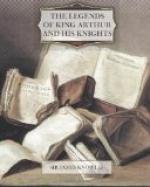“Is he Sir Lancelot?” said Sir Tristram.
“Nay,” answered Sir Persides, “it is Sir Palomedes, who is yet unchristened.”
Within a while one came and told them that a knight with a black shield had smitten down thirteen knights. “Let us go and see this jousting,” said Sir Tristram. So they armed themselves and went down. And when Sir Palomedes saw Sir Persides, he sent a squire to him and proffered him to joust. So they jousted, and Sir Persides was overthrown. Then Sir Tristram made ready to joust, but ere he had his spear in rest, Sir Palomedes took him at advantage, and struck him on the shield so that he fell. At that Sir Tristram was wroth out of measure and sore ashamed, wherefore he sent a squire and prayed Sir Palomedes to joust once again. But he would not, saying, “Tell thy master to revenge himself to-morrow at the Maiden’s Castle, where he shall see me again.”
So on the morrow Sir Tristram commanded his servant to give him a black shield with no cognizance thereon, and he and Sir Persides rode into the tournament and joined King Carados’ side.
Then the knights of the King of North Wales came forth, and there was a great fighting and breaking of spears, and overthrow of men and horses.
Now King Arthur sat above in a high gallery to see the tourney and give the judgment, and Sir Lancelot sat beside him. Then came against Sir Tristram and Sir Persides, two knights with them of North Wales, Sir Bleoberis and Sir Gaheris; and Sir Persides was smitten down and nigh slain, for four horsemen rode over him. But Sir Tristram rode against Sir Gaheris and smote him from his horse, and when Sir Bleoberis next encountered him, he overthrew him also. Anon they horsed themselves again, and with them came Sir Dinadan, whom Sir Tristram forthwith smote so sorely, that he reeled off his saddle. Then cried he, “Ah! Sir knight, I know ye better than ye deem, and promise nevermore to come against ye.” Then rode Sir Bleoberis at him the second time, and had a buffet that felled him to the earth. And soon thereafter the king commanded to cease for that day, and all men marvelled who Sir Tristram was, for the prize of the first day was given him in the name of the Knight of the Black Shield.
Now Sir Palomedes was on the side of the King of North Wales, but knew not Sir Tristram again. And, when he saw his marvellous deeds, he sent to ask his name. “As to that,” said Sir Tristram, “he shall not know at this time, but tell him he shall know when I have broken two spears upon him, for I am the knight he smote down yesterday, and whatever side he taketh, I will take the other.”
So when they told him that Sir Palomedes would be on King Carados’ side—for he was kindred to King Arthur—“Then will I be on the King of North Wales’ side,” said he, “but else would I be on my lord King Arthur’s.”
Then on the morrow, when King Arthur was come, the heralds blew unto the tourney. And King Carados jousted with the King of a Hundred Knights and fell before him, and then came in King Arthur’s knights and bare back those of North Wales. But anon Sir Tristram came to aid them and bare back the battle, and fought so mightily that none could stand against him, for he smote down on the right and on the left, so that all the knights and common people shouted his praise.




